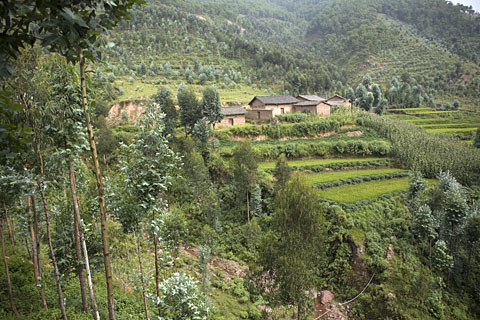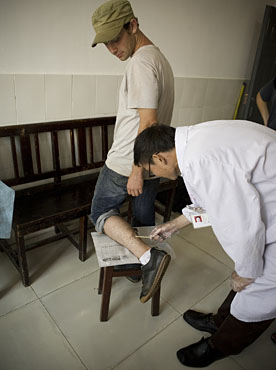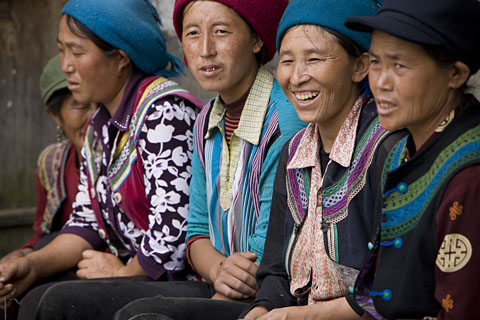
Sitting in an internet cafe in the steamy Amazon port city of Iquitos in North-Eastern Peru, I began to get a glimpse of what my life could be like if I continued to work hard… a nomad or a bedouin of sorts, but less romantic, with a hotel for a home and Sky Chef as my most-frequented restaurant. It was in Iquitos that with a bit of trepidation and negotiation I received my China assignment with Heifer International. There I was, halfway through my stint in Peru knowing that the second I got back to the states I had just over two weeks to submit my work, get a visa from the Chinese embassy and send my passport off to Philadelphia. Additional pages needed to be added to make room for the official stamps given at each border I might cross for the next few years.

I’d have no idea what was waiting for me on the other side of the immigration gate in Beijing. To begin with, my 13.5 hour flight direct from Washington was delayed for a bit, allotting me just two hours to pass through customs and immigration. After getting through what seemed more like a Russian bread line, I had twenty minutes to check in and make my flight. I resigned myself to the fact that if I made it, my luggage would not.
I sprinted to the Air China check-in, but after pulling out my passport and itinerary the two guys at the desk just kept scratching their heads at the screen in front of them. Finally they handed them back and said “ticket office” – never a good sign. I went to every Air China office I could find but no one seemed to know anything, and no one spoke English. Two hours later I was still frantically running around the airport, now with two hawks (whose aid I had not requested) carrying my bags while demanding in a primitive international sign language that I go to the nearest ATM to take out money for their services. I finally got to a small Air China desk that seemed to know perfectly well what had happened, promptly printing me a boarding pass on the next flight to Chendgu, (above) the hub of South Central China. I never found out what the problem was until meeting up the next day in Chengdu with Christian DeVries, a freelance writer with whom I’d be collaborating over the next two weeks. In an effort to cut air pollution ahead of next summer’s Olympic Games, the Chinese government had canceled a number of domestic flights and barred half the cars in the capital from driving on the roadways for the day. I wonder if mandatory conversational English crash-courses for all airport personnel are not somewhere in the list of all the draconian measures Beijing’s officials are enacting.

The day after my arrival in Chengdu, a city of five million, I was immediately catapulted off to a world I never knew existed. We headed south near the Tibetan border to the cool mountains of the Sechuan region. There Christian and I were to meet the Yi people, an ethnic minority whose way of life carries on much the same as it has for centuries past, in stark contrast to the bustling, westernized streets of cities like Chengdu. The Yi people are well known for their ornate traditional dress, still worn by most women and some men, but less known for their habit of sitting and even lying on the roadways during their down time. This can make for an interesting drive through the region’s winding mountain roads. The ease with which I could photograph people was somewhat hampered by the necessity to use two translators (English to Mandarin to Yi) to get my words across.

If you’re unfamiliar with Heifer International (HI), take a brief look at my Ukraine post from June or their website. Of the many development organizations working in poverty-stricken areas around the world, I have become partial to Heifer’s model of self-sustainability, having witnessed its effects first-hand. Heifer works mainly in rural areas, where China’s poorest live. It’s hard for us to imagine how a cow or a few goats can transform the life of a family, but as in most pastoral societies, wealth is measured by the amount of livestock one owns.

The Jieshuo family (shown above) has moved out of extreme poverty since receiving their 15 or so goats from Heifer. The goats provide meat for the family, and offspring are sold or bartered for additional food supplies: “Our children live better and better as the years go by. Before the project we only had potatoes to eat. Now we have rice, more meat, and eggs for the children,” says Chuomu Aniu, the wife and mother of three (above, far left). In addition to their three children, Chuomu Aniu and her husband Jieshuo Er’ri are able to care for their nieces and nephews, whose parents are deceased.

Within the Yi prefecture and to a greater extent in other areas of China, the young are fleeing the countryside and their agrarian culture to make new lives in the cities. Urban life offers higher wages, and for some, the chance to earn an income for the first time. However, this phenomenon creates problems on both sides: a lack of workforce and production in rural areas and overpopulation and unemployment in the cities. Above, Jiese Wujia (68, left) and her husband Mose Youha (71, right) will retire when their bodies do. Below, a man passes a sleeping street-child in early morning Chengdu.

I’m fortunate to have navigated the ropes of many developing countries with minimal physical wear and tear throughout the last few years. However, I wasn’t so lucky in rural China. On the third day of the trip, I asked our driver to stop so I could photograph a herd of water buffalo that was approaching our vehicle on the road. As I was shooting, I backed up straight into the vicinity of a dog chained on the side of the road who wasn’t so happy that I entered his territory. I ran back to the car pulling up the torn leg of my jeans, dismayed to see that his bite had caused some bleeding. Bei, our coordinator and Christian’s translator, was on the phone immediately as we drove back to town. Joy, my translator, offered endless condolences. The rabies vaccination was not available in our area but was to be delivered to the hotel later that night. The five-part vaccination required me to stop into the clinic two additional times while in China. Furthermore, since the vaccinations in China and the US differ, I had to bring the last two doses back with me on the plane in an ice-packed thermos. I just received my last dose this week. Below, I receive complementary medical care from The People’s nationalized health system.

The second half of our journey took us north of Chengdu to Nanbu County and east to the municipality of Chungqing. In this sweltering hot region of the country where temperatures reached well over the hundred degree mark, villagers were harvesting their rice fields. Below, farmer Zhang Weishu separates rice grains from cut grass. Heifer donated pigs to his family, but also set him up with a bio-gas unit for his kitchen. Bio-gas is a method of cooking where manure from animals is placed in a pit outside the house. The methane that the manure gives off is transported to the kitchen’s cooking range just like natural gas or propane; with no observable odor. “Using bio-gas has saved resources; it is clean and saves time,” says Mr. Zhang.

Zhang Weishu’s neighbors, Zhang Weiping and his wife Xie Shutang (shown respectively in the following two photographs), are also Heifer project participants. In fact, most everyone in this village has been helped out by Heifer. (The name of the village is Village #12, can you get more Marxist than that?!) Residents say their village was all but forgotten by the government until Heifer started working here and began bringing families out of poverty. Only then did the government build a road through the village.


Not only has the Chinese government kicked in to help out where it previously hadn’t, but it has also mimicked the Heifer model of livestock distribution to needy families in places in China where Heifer is not already working. Below, Wen Yongqing and her husband Wu Yuantian sort silkworms given to them by HI. “Before I was not so hard working and my wife was always angry with me. Now she doesn’t get mad so easily because I am working hard,” says Mr. Yuantian. (We all know his wife is probably just too demanding.)

Driving around Chengdu at night with the windows down, Christian and I marveled at glitzy neon streets and the abundance of advertising billboards that often stretch across the width of entire skyscrapers. Western brands are popular here, from the ubiquitous Starbucks and KFCs to high end fashion like Louis Vuitton and Hugo Boss, while BBC and CNN are banned. Homesick for American radio, Christian and I would often sing the songs of our homeland during long drives, perhaps sometimes to the chagrin of those in our entourage. That night we began to sing “Sounds of Silence” when after the first line, our driver, who spoke no English, immediately perked up and began fumbling through the glove box. He found a CD and slid it in. We waited to hear what it was: “Hello darkness my old friend…”
We almost lost it. Christian and I started laughing hysterically while Bei and Joy were perplexed. By the second line we were belting out the words right along with Paul and Art. Unable to discuss politics or religion or media coverage openly, it was as if we were sending out all that we meant to express in code: “Hear my words that I might teach you, take my arms that I might reach you.”

As China’s economy continues to open and grow, more and more people continue to climb out of poverty. In fact, if the UN reaches its Millenium Development Goal of cutting global poverty in half by the year 2015, it will be because of promising statistics coming out of China and India. Around 10% of the Chinese population is living below the poverty line. That sounds like a pretty good statistic until you figure that 10% of the population equals 130 million people, more than the entire population of Japan.

Cities continue to expand and quality of life there is, for the most part, better. But change is slow to reach the countryside where education is not yet a universal affair and where power lines and water pipes don’t always stretch.




